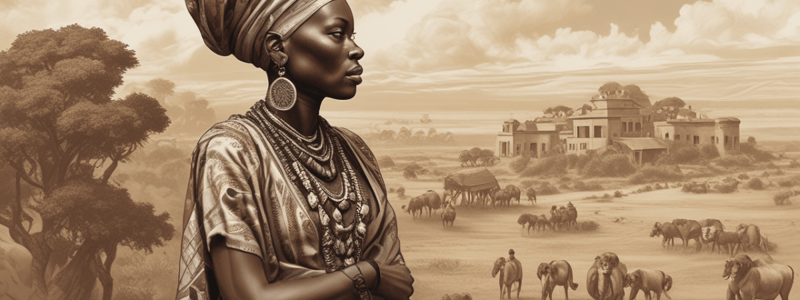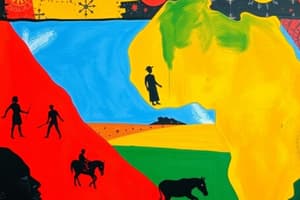Podcast
Questions and Answers
What was the reason behind Cecil Rhodes' determination to prove that the Great Zimbabwe was the capital of an ancient Phoenician colony?
What was the reason behind Cecil Rhodes' determination to prove that the Great Zimbabwe was the capital of an ancient Phoenician colony?
- To understand the architecture of the great enclosure
- To justify the use of Africans as cheap labor (correct)
- To explore the city's commercial potential
- To prove the existence of the Queen of Sheba
What was the consequence of Richard Hall's actions on the Great Zimbabwe ruins?
What was the consequence of Richard Hall's actions on the Great Zimbabwe ruins?
- The promotion of tourism in the area
- The discovery of irrefutable evidence of the city's African origin
- The preservation of the site's original state
- The removal of all African artifacts and accurate archaeological dates (correct)
What was the significance of the pottery shards and beads found in Great Zimbabwe?
What was the significance of the pottery shards and beads found in Great Zimbabwe?
- They dated back to around 1100 and testified to the city's rapid rise as a commercial center (correct)
- They were used as currency for trading with China
- They were evidence of the city's biblical origin
- They were used to build the great enclosure's conical tower
What was the outcome of David Randall McIver's excavations in 1906?
What was the outcome of David Randall McIver's excavations in 1906?
What is the current concern regarding the Great Zimbabwe ruins?
What is the current concern regarding the Great Zimbabwe ruins?
What was the Great Zimbabwe once subjected to due to ignorance and prejudice?
What was the Great Zimbabwe once subjected to due to ignorance and prejudice?
What did the white colonizers mistakenly believe the Great Zimbabwe was?
What did the white colonizers mistakenly believe the Great Zimbabwe was?
What was unique about the masonry of the Great Zimbabwe's stone walls?
What was unique about the masonry of the Great Zimbabwe's stone walls?
What can be inferred about the labor force that built the Great Zimbabwe?
What can be inferred about the labor force that built the Great Zimbabwe?
What is the significance of the Great Zimbabwe in modern times?
What is the significance of the Great Zimbabwe in modern times?
Flashcards are hidden until you start studying
Study Notes
- The Great Zimbabwe is a mysterious ruin in southern Africa that was once stripped of its priceless artifacts by racist colonizers due to ignorance and prejudice.
- The African people who lived around the ruins, the Shona, called them Zimbabwe or sacred houses, but they offered outsiders no tools to understand the mysterious lost culture that had flourished there.
- White colonizers envisioned the ruins as the biblical Palace of the Queen of Sheba or a city established by the Phoenicians, but the Great Zimbabwe was actually a thriving African culture, a magnet for trade from as far away as China, and a home to skilled artisans and stonemasons.
- The city was subject to incorrect speculation and physical destruction by colonialists, who plundered its ruins and ravaged its legacy.
- The Great Zimbabwe is an object lesson in the dangers of colonialism and the importance of reclaiming African heritage.
- The site is situated about 200 miles south of Zimbabwe's capital city, and sprawls over some 1800 acres, featuring the largest stone constructions south of the Sahara Desert.
- The remarkable masonry is done with dry stone walling without the use of mortar, and was built by a labor force working to a design in their heads rather than on paper.
- The construction of the freestanding stone walls required great skill, but the identity of its builders remained a mystery to outsiders for hundreds of years.
- The Portuguese explorers learned about the city from Swahili traders, and European Christians speculated that the rumors described the fabled capital of the Queen of Sheba.
- The German geologist Karl Mauch believed the ruins were a copy of Solomon's Temple, and the building on the plain was a copy of the palace where the Queen of Sheba lived during her visit to Solomon.
- The myth of a biblical origin was convenient for the Afrikaners, as it gave a historical precedent for colonization and a biblical sanction for the exploitation of Africans.
- The Great Zimbabwe suffered cruelly under these imagined biblical sanctions, with big game hunters, fortune hunters, and English settlers plundering the site and exploiting African labor.
- Cecil Rhodes, the driving force behind colonization, was determined to prove the theory that the Great Zimbabwe had been the capital of an ancient Phoenician colony, and he used this theory to justify the use of Africans as cheap labor.
- Richard Hall, a curator appointed to the Great Zimbabwe ruins, had racist attitudes and set out to remove the "filth and decadence of kafir occupation" from the site, effectively stripping the ruins of all African artifacts and making it impossible to get accurate archaeological dates.
- David Randall McIver, a qualified archaeologist, found irrefutable evidence of the true builders of the mighty walls, but his work was met with resistance and an appalling cover-up by the colonial government.
- The scientific community eventually had enough of Hall's brutal treatment of the Zimbabwe ruins, and demanded that he be replaced with an unbiased professional archaeologist.
- In 1906, David Randall McIver conducted brief excavations and concluded that the ruins were entirely of African origin and medieval date, but his findings were dismissed by Rhodesia's white government.
- It would be more than two decades before another qualified archaeologist was allowed onto the site, with Gertrude Catlin Thompson investigating Great Zimbabwe again in 1929 and confirming McIver's discoveries.
- The people of Zimbabwe were finally free to search for their past among the ruins after a bloody civil war in 1980, but the questions remained about how much of Zimbabwe's past could be reclaimed from the stripped ruins.
- The first people to settle at Great Zimbabwe were cattle farmers who arrived around 8350, drawn by rich grazing land and a temperate climate.
- The people who built Great Zimbabwe were ancestors of the present-day Shona people of Zimbabwe, who built mud and stick homes in and around their evolving stone walls.
- Pottery shards and beads dating to around 1100 testify to the city's rapid rise as a commercial center, with the Zimbabweans trading their gold and ivory down the nearby Sabi River to the coast.
- By 1300, the Zimbabweans were trading with as far away as China, exchanging goods for beads and porcelain.
- The Great Zimbabwe's most enduring monument, the great enclosure, testifies to the confidence and skill of a thriving culture, with its intricate decorations and conical tower.
- Today, 20,000 tourists visit the Great Zimbabwe each year, eager to reclaim some of the city's rich heritage, but their presence is taking a toll on the ancient stone walls.
- The caretakers of the site have enlisted the help of modern technology to preserve the labor of long-dead masons, marking and entering each surface stone into a computer to plot their reconstruction.
Studying That Suits You
Use AI to generate personalized quizzes and flashcards to suit your learning preferences.




